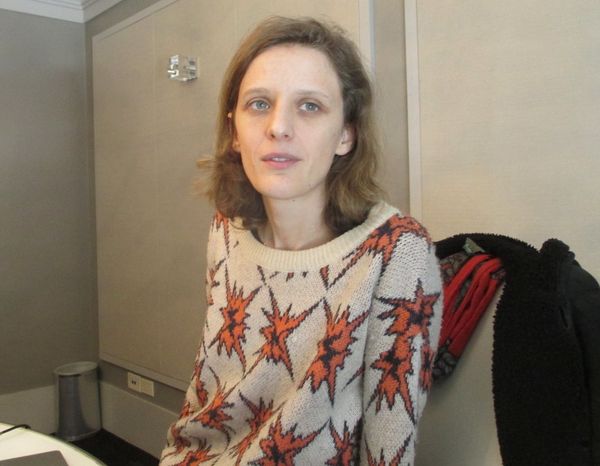 |
| Mia Hansen-Løve on Maya and Bergman Island: "You could eventually say that hauntedness is the one thing maybe the two films have in common." Photo: Anne-Katrin Titze |
In Margarethe von Trotta's Searching For Ingmar Bergman, Mia Hansen-Løve speaks about how Ingmar Bergman's house on Fårö is haunted. Mia's Maya tells the story of journalist Gabriel (Roman Kolinka) who was a hostage in Syria, together with his associate Frédéric (Alex Descas). Returning to France, he cannot cope. Gabriel tells the psychologist (François Loriquet): "The worst was feeling guilty." But he doesn't want therapy because he himself "works with words." It is "the kidnappers who need analysis." His former girlfriend Naomi (Judith Chemla) serenades him with Schubert "Liebchen, komm zu mir!" but not even the moonlight can make him reconnect.
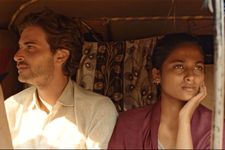 |
| Gabriel (Roman Kolinka) with Maya (Aarshi Banerjee) |
Gabriel wants to go to India, to the overgrown house in Goa where he spent his childhood. His godfather Monty (Pathy Aiyar) owns a hotel nearby and he meets his daughter Maya (Aarshi Banerjee) who will eventually ask him the film's two pivotal questions. "Do you believe in ghosts?" "And in God?" Maya and Gabriel travel together in India, there will be a fire and hauntings that never cease. It is a film of escape and confinement, which might as well be the daydream of a man in a shower who had just been freed from captivity.
At the Loews Regency Hotel on Park Avenue during the uniFrance and Film Society of Lincoln Center's Rendez-Vous With French Cinema, Mia Hansen-Løve and I talked ghosts in cinema, a need for reinvention, an Ingmar Bergman obsession, and where the title Maya came from.
Anne-Katrin Titze: The last time I saw you - not in person, but on the screen - was in Margarethe von Trotta's Bergman documentary.
Mia Hansen-Løve: Oh, I haven't seen it.
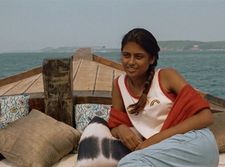 |
| Mia Hansen-Løve on Aarshi Banerjee's character: "The name Maya, was inspired to me by a song by The Incredible String Band … it's a song I loved and it really is about this idea - we're all one." |
AKT: The clip she used is of you saying how Bergman's house on Fårö is haunted, how there are ghosts on the island. And then in Maya there's the question "Do you believe in ghosts?" and "Do you believe in God?" The question of hauntedness is always there in Bergman. Where are you with Bergman Island?
MHL: You could eventually say that hauntedness is the one thing maybe the two films have in common. In Maya it's not so obvious but it's there to me. Somehow it deals with that. Although you could say, he [Gabriel] is the ghost maybe, and he comes back to life through Maya. But there is this issue of: Is it real? Am I real? Do I really exist? Feeling yourself alive is really what the film is about, too. At some point, when he is in the house, Maya is almost there like a ghost he dreams about. But it's not only dreaming, you know, he hears her calling him.
And in a very different way I think Bergman Island also is about that. It's not that I believe in ghosts, I'm just curious. This question of God or ghosts, do they exist? You know, that was a question I think that actually obsessed Bergman, too. I think cinema is also a lot about ghosts. I think you cannot make films and not be interested in ghosts.
AKT: Because it deals with spectres, it is the return of something. You can watch something in cinema ...
 |
| Mia Hansen-Løve on the set with Searching For Ingmar Bergman director Margarethe von Trotta |
MHL: … that is gone! Any image that you look at on the screen is actually gone. So you deal with that all the time when you make films, you're actually filming what's disappeared. So if there was a medium capable of filming ghosts, cinema would be the medium. I think it's natural when you make films that at some point you have this interest for hauntedness.
AKT: It also happens in fairy tales where you have a one-dimensionality. It's all taking place on the same level: the ghosts, the people, animals that talk, God. It's all one. You can walk or fly from one place to another and it's no problem in tales. A lot of cinema that I don't like that much, loses that quality. Cinema that goes into the direction where it thinks it needs to explain everything. I don't want that.
MHL: I totally agree! And you just said that it's all one. And I think this could be a very good summary of what I was trying to do in Maya or the way I was trying to look at the world. The title Maya, by the way, and the name Maya, was inspired to me by a song by The Incredible String Band, a hippie band from the Seventies. It's a song I loved and it really is about this idea - we're all one.
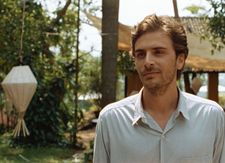 |
| Mia Hansen-Løve on Roman Kolinka's Gabriel: "He is the ghost maybe, and he comes back to life through Maya." |
And the idea that the whole world is animated, just as you said. I think I try to create this world where things are animated, even if I do it in a very discreet way, or subtle way. It's not so obvious. It's not like everything is said, like "oh, we have ghosts here," or plants are actually talking.
AKT: The hotel that is owned by Maya's father and the Christmas celebration with the girls practising their performance going on there, has a unique feel.
MHL: Also when they visit the forts close to the beach and they make this trip with a boat. The two of them visit this old Portuguese fort eaten by the jungle, to me this is a specially animated place. It's a place I knew before and I had this very strong feeling about this place and I wanted to go back there and try to capture that.
AKT: From being a hostage and having your life taken away to finding it again - it's not a straight line you are showing.
MHL: No.
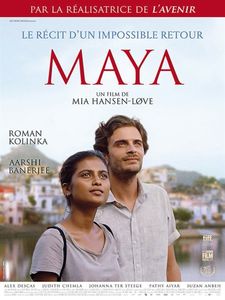 |
| Maya French poster |
AKT: Most people, thank goodness, are not in a hostage situation, but there is something universal about the process, maybe because you are so specific.
MHL: I try to start with a very uncommon, dramatic situation. But I use that as a starting point to actually try to deal with something that is universal and that everyone can be confronted with. Moments when you are lost in your life and you're trying to find a right way. You don't know which one you should take. I think I was myself going through the same thing in a very different way, obviously, when I made the film.
As all of my films, it reflects the situation I was in when I was writing it. My own need to reinvent myself and start a new life. And the fact that I felt I could start it only while actually physically experiencing another place.
AKT: That is physically another place and in the story of Maya it is as well an attempt to return to his [Gabriel] childhood. The paradox of the other and the lost?
MHL: But you cannot return to childhood. That's lost, so it's an illusion. Maybe he thinks he is returning to his childhood. He is returning to his mother too, but they can never really meet again. Ultimately what India brings to him back is not his childhood but it gives him the chance to meet Maya and that gives the meaning of the whole trip to him.





















